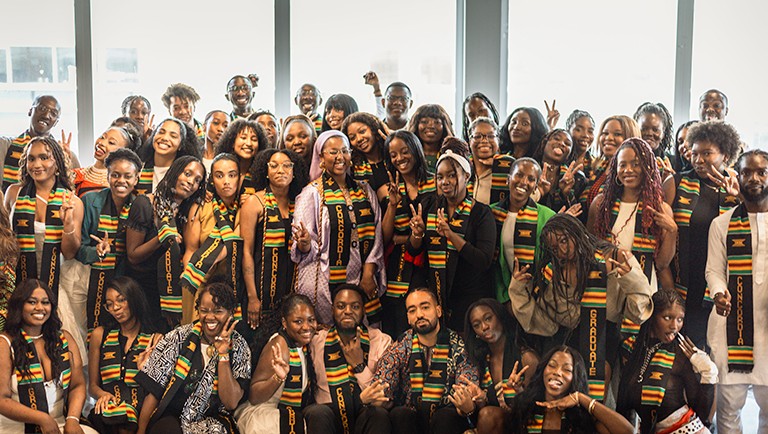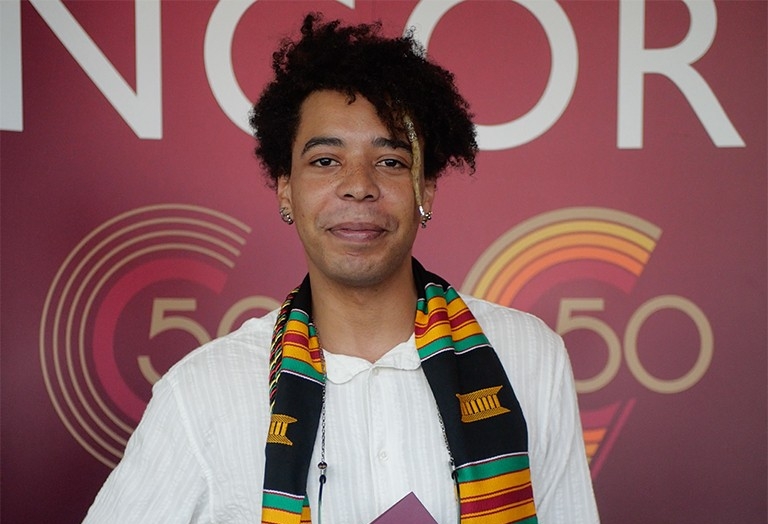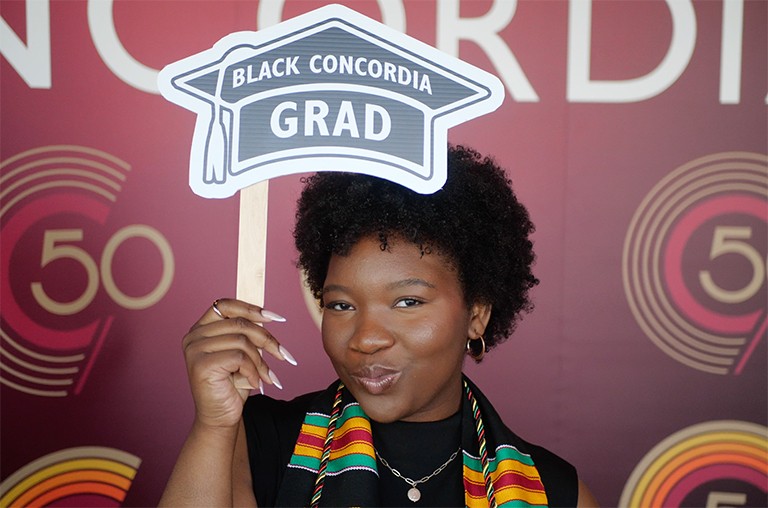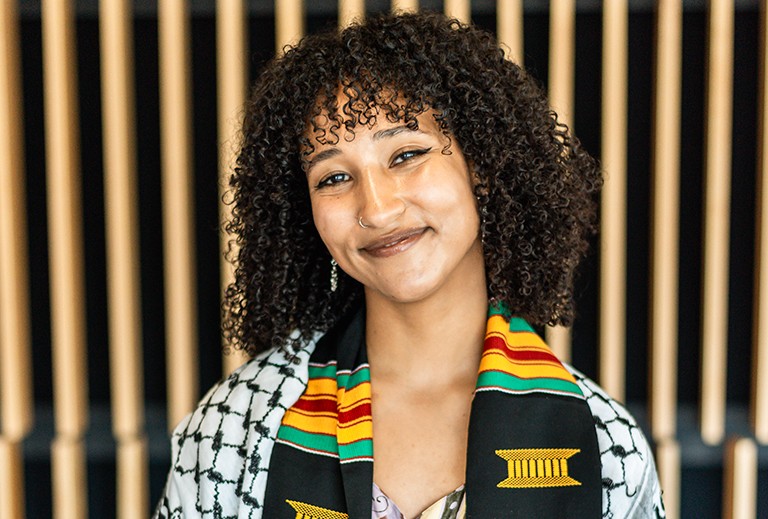NouLa celebrates Concordia’s Black graduates

The NouLa Black Student Centre hosted the fourth annual Black Graduation for more than 50 graduates on June 2. It was a chance for Black students to celebrate their achievements with their families, friends, professors and Concordia community members and to welcome them to the Black alumni network.
NouLa manager Teeanna Munro describes the atmosphere as high energy, joyous and full. “People were filled with so much emotion — pride and joy. There was a lot of laughter and tears,” she says.
This year’s graduation was significant as it marked the first full academic year of NouLa.
Since opening in September 2024, NouLa has become a vibrant hub for Black students, offering personalized academic and culturally relevant support. The centre helps students navigate university life and foster connections with Black communities at Concordia and in Montreal.
Graduate Nimi Mountain expresses his appreciation for the uplifting and intimate nature of the celebration. “It’s about taking an extra moment to recognize and acknowledge the additional pressures that Black students face,” he says.
Meet three of the 2024 Black graduates
 Nimi Mountain: “It’s not acknowledged how integral Black history is to the history of this country.”
Nimi Mountain: “It’s not acknowledged how integral Black history is to the history of this country.”
Nimi Mountain
BA, Major Human Environment, Minors in First Peoples Studies and Geospatial Technologies
Winner of the Black Excellence Award for Academic Achievement and the Black Excellence Award for Perseverance
Nimi Mountain changed his major to human environment, driven by the like-minded people he met in the Department of Geography, Planning and Environment and his success in his geography classes, he explains. Mountain also took on two minors.
In First Peoples Studies, “there were definitely some courses that I think every person should take, not just university students,” he says. And in Geospatial Technologies, he saw the potential of developing technical skills to address social and environmental issues.
As an older student, Mountain admits he was initially unsure about getting involved in student life but came to take on mentorship and advocacy roles.
At World University Service of Canada (WUSC) Concordia, he helped refugee students adapt to Montreal and navigate key administrative tasks. In the Geography Undergraduate Student Society, he represented the interests of peers in his department.
Mountain first heard about the creation of a Black student centre through the President’s Task Force on Anti-Black Racism. Knowing about the Otsenhákta Student Centre and the impact it has for First Nations, Inuit and Métis students, he followed the development of NouLa and eventually became an active member of its community.
Beyond providing a space for Black students, Mountain highlights NouLa’s crucial role in recognizing the contributions of Black students and communities.
“It’s not acknowledged how integral Black history is to the history of this country,” he notes. “Having a space to celebrate, it’s not just for Black people, but for the betterment of all of society.”
At the celebration, Mountain was recognized for both his academic perseverance and his exceptional GPA. Looking ahead, he will apply this motivation to learn on his own time and potentially pursue graduate studies in the future.
“My journey went from being lost, to gaining more confidence in myself through school, to thinking I could do more school eventually,” he says. “It feels like there are more doors open.”
 Élisabeth Ndeffo: “It’s important to understand where you come from.”
Élisabeth Ndeffo: “It’s important to understand where you come from.”
Élisabeth Ndeffo
BA, Major Journalism, Minor History
Winner of the Black Excellence Award in Student Engagement
Élisabeth Ndeffo knew that she wanted to study journalism, with a passion for seeking out hidden stories from people’s day-to-day lives, she says.
Before attending Concordia, Ndeffo had completed her studies in French in Montreal. “I knew I could write well in French,” she says. “But I also wanted to write in English, to open doors to work internationally.”
At first, the transition to studying and writing in English was a challenge, but Ndeffo credits her success to seeking support, taking courses that improved her English writing skills and seizing opportunities that came her way. Her advice to other students: “You don’t have to be perfect — just get out there and explore.”
Building her journalistic portfolio, Ndeffo contributed to The Link and served as an associate editor at The Concordian. In her final year, she interned at CBC. She also honed her video creation skills, working with the Stingers and Concordia Advancement.
When Ndeffo posted a video to her own social media spotlighting Black students at Concordia, other students reached out to her about finding the Black community. She helped direct them to cultural groups like the African Student Association of Concordia, the Haitian Students’ Association of Concordia and the Nigerian Students’ Association of Concordia as well as the Black Perspectives Office, before the creation of NouLa.
“You really want to find a sense of belonging at a big school. As a Concordia student, you’re in contact with people from so many places,” she says.
“You become more cultured, and you understand other people’s realities better. It’s important to understand where you come from, and you get to understand where other people come from too.”
 Ourania Ntagizege-Nima: “With time, you’ll find your place and make connections. Find the things you enjoy and leave the things you don’t.”
Ourania Ntagizege-Nima: “With time, you’ll find your place and make connections. Find the things you enjoy and leave the things you don’t.”
Ourania Ntagizege-Nima
BA, Major Psychology, Minor in Human Geography
Ourania Ntagizege-Nima reveals that she chose Concordia for its legacy as a progressive university, fuelled by a rich history of student engagement and organizing. Getting involved in advocacy work helped her connect with students, faculty and community members who shared her dedication to social and environmental justice.
For Ntagizege-Nima, taking an urban agriculture course with part-time instructor Erik Chevrier, a member of the solidarity cooperative of urban farmers CultivAction, helped her get involved with farming initiatives on the Loyola Campus. This hands-on course, along with Hamidou Horticulture, which grows hard-to-access African and international vegetables at Loyola, inspired her to co-found the Sankofa Farming Cooperative.
Sankofa is a non-profit focused on food sovereignty, sustainability and skill-sharing in Afro-descendant communities.
“We’re taking an Afro-Indigenous approach to working the land and healing ourselves while healing the land,” she explains.
From her time at Concordia, Ntagizege-Nima says she feels most proud of the connections she made with inspiring professors. In particular, she notes the impact of the Black faculty who taught many of her favourite courses.
For students looking to connect with Black community, she recommends the support provided by NouLa: “They have beautiful resource lists for volunteering and job opportunities and even a list of Black professors to make sure you’re taking classes with them.”
Ntagizege-Nima’s advice for future students? “Take it easy. With time, you’ll find your place and make connections. Find the things you enjoy and leave the things you don’t.”
Connect with the NouLa Black Student Centre at Concordia.


